#who grew up with enough access to our own culture
Text
Attention Goy Friends!
I was recently asked by another goy friend on Facebook to explain something. And I thought I’d share it here for people who are not in the know.
This person wanted to know why we get SO upset when synagogues are defaced. It wasn’t like they were telling me they didn’t understand why we got upset at all. But they didn’t seem to understand where the depth of feeling came from, especially when there is actual genocide happening to Palestinians. This is a good person acting in good faith and is working on holding two truths at once, so I answered. Here’s what I told them:
First of all, of course, we can fight for Palestinian liberation shoulder to shoulder and feel as awful as you do about it! I hate this genocidal Likud party and their deranged evil leader just like anyone else would. This does not mean we don’t also carry our own pain. It doesn’t mute the pain we carry for Palestinians. We just feel EVEN WORSE on top of that.
Second, with regard to synagogues and other places of Jewish social gathering—I think those of us living in Christian-majority nations all know a fair bit about Christian history just by way of cultural exchange. But if you are not aware—The Protestant split in Europe led to the translation of Church services and texts into English/the primary spoken languages of the various Western European nations worshipping within various Jesus-centric religions. This was a huge and important milestone for poor and lower class people who had every right to participate equally and fully in their religion and could now understand the scriptures and services.
However, to this day, shul is conducted in Hebrew. Prayers are sung in Hebrew. In every Jewish synagogue regardless of denomination. Sure, there are often parts in the common tongue of the area too, but the prayers themselves are still in Hebrew. Usually the same melodies or selection of melodies too. And it’s not because we are some elitist group, as some might claim.
It’s because, even in diaspora, I can go to any Jewish community in the entire world. I may not speak the common tongue of whatever place I end up. But I can go there, listen for the sound of Jewish prayer. If I have nothing to my name and no money or food or home or safety I can look for some Hebrew on a door or a Jewish star and listen for someone singing Oseh Shalom or the Shema Yisrael or the V’ahavta in the same melody that I learned it growing up. And I will have found safety. I will have found community. I will have found people who understand me.
And the part of this that I think most goyim don’t understand is that because of our long history with Christianity there is statistically a more than 50% chance that I or other members of my generation will actually NEED to employ that Jewish community as a resource in the exact circumstance I described above. Because we become victims of genocide within 2-3 generation intervals like clockwork for the last 2000 years.
When a synagogue is attacked in a nation that allows antisemitic hatred to foment unchecked it is such a brutal emotional blow. Because every synagogue destroyed is a safe place for Jews that is no longer safe. Not for the people who go there regularly. And certainly not for the people who may need to go there—who will VERY LIKELY need to go there. And with each space eliminated, we are sent further into diaspora.
#jewish diaspora#Jewish pain#antisemitism#context#for the goys#who are trying to remain educated#jumblr#Judaism son#there are so few Jews left in the world at all#and 46 percent of them are in Israel#it’s tempting to be upset and dismissive of people who ask these things#but I have to try and remember#with so few of us left#how many people have actually met Jews#we are 0.2% of the population#we are 2% of Americans#how many of us even ARE THERE who KNOW this information#who grew up with enough access to our own culture#to provide answers#and of that even smaller proportion of us#how many goyim could have possibly met us#so even when I want to scream#I have the ability to educate#so I must#goyim
34 notes
·
View notes
Text
Good psychology and psychiatry needs to acknowledge that culture isn't just spatial, but temporal
There was a whole generation that grew up on black and white TV. The technology of the time altered their dreams so that they dreamt in black and white. Many still do to this day.
But this culture that led to this situation is dead. Children will no longer be born into a world where their dreams will be influenced by only having access to black and white television.
Plural systems 40 years ago didn't have support networks. There was no internet, and no one wanted to talk about hearing voices or feeling like people in their head were taking control of their body.
With the advent of the internet, this culture too is dead, and it's for the best.
Now, systems have access to other systems. We have an environment where we won't be judged, or if we are, it won't affect our relationships with our friends or family outside of the internet until we're ready to come out. We're safe and can support each other. And when systems do come out, they can feel much more comfortable with themselves in doing so.
And this also goes for many DID and OSDD systems as well. The shame attached to many of the symptoms of DID is less pervasive because of community support.
But psychiatry isn't acknowledging that the culture of isolation of the 80s and 90s is largely dead now.
When older doctors see kids coming in who have self-diagnosed and aren't ashamed of themselves, they assume that the children of the internet age should be behaving like the children of past generations. But our own generation isn't that generation.
You're not fake just because you aren't ashamed of what you are and what you experience.
You're not fake because you don't act like the last generation of plurals who didn't have access to the support networks we do today.
And psychiatry HAS to keep up with the times. It has to acknowledge that it can't apply the same standards of the pre-internet era to the post-internet era, because our culture today is radically different from theirs.
And we also need to talk about the mental health crisis when it comes to dissociative disorders that led us here.
There is no mass number of people being misdiagnosed with dissociative disorders. In fact, many studies have shown that people dissociative disorders are more likely to be misdiagnosed with Schizophrenia, and the ones who end up correctly diagnosed have to spend an average of 6 years before getting the correct diagnosis.
For decades, experts have been estimating that the number of people with DID was actually close to 3% of the population. In the US, that's about 9 million people. That's an overwhelming number of mostly-undiagnosed DID systems when so many psychiatrists have been given zero training in treating it.
The shortage of healthcare isn't because of some group of boogeymen "fakers" who are stealing resources.
It's because our culture changed. More systems with dissociative disorders became aware of being systems and are seeking help they need. They don't feel shame at their symptoms like they once would have. And our psychiatric institutions have failed them.
This could have been avoided if more psychiatrists had been trained to diagnose and treat dissociative disorders because they knew that this was a problem.
Instead of acknowledging their own failings on this matter, they are doubling down and fakeclaiming systems publicly for not being ashamed enough of themselves, like "real" systems should be.
TikTokers are not responsible for a lack of resources for systems. A psychiatric institution that ignored all the warning and attempts to raise awareness about the true frequency of these disorders is.
#syscourse#psychiatry#plural#plurality#multiplicity#pluralgang#plural pride#systems#system#endogenic#pro endo#pro endogenic#system stuff#psychology#psych critical#anti psych#pro psych#mental health#psychiatrists#mclean hospital
181 notes
·
View notes
Text
RE✱BRIEF
Part 1: The Plot So Far
Leaf Debrief began as a podcast in late 2020 with the rather simple goal of providing an accurate, accessible, uncensored, and entertaining source of information about cannabis.
I launched it with my friend and co-host, Enzo, shortly after the launch of legal cannabis in Canada. We were both excited about the potential of this new industry and wanted to share our enthusiasm with others, but we also wanted to be realistic about the challenges and risks that come with it—a source of information that people felt they could trust.


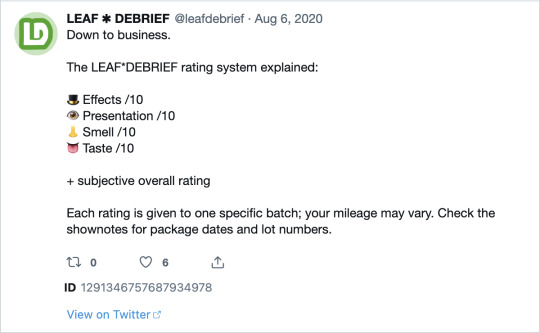
We had a lot of fun making the podcast, but it was also a lot of work and came with an unforeseen challenge: balancing our love for the plant with our growing concerns about the industry.
We were both becoming increasingly disillusioned with the industry and the direction it was heading in, while simultaneously also becoming increasingly concerned about the environmental impact of cannabis production and consumption that this new industry was carelessly ushering in.
We were both feeling a bit lost and unsure of what to do next, and as the onslaught of COVID-19 began, the need to find a solution to the destructive nature of capitalism as a whole became increasingly dire and left us fraught with a sense of urgency that can be heard in our voices more with every passing episode.
By the 8th episode Enzo's conscience was audibly worn to tatters, and by the next recording, we were announcing his decision to retire from the podcast entirely.
I recorded once more with a couple of guests from the cannabis space to get a feel for his absence, and was then left to decide whether or not I wanted to continue on my own. I decided to take a break and think about it, and in the meantime I began to explore other ways of sharing my thoughts and ideas about cannabis and the industry.
I started writing more on Twitter because I had previously found it to be a great way to connect with others in the cannabis space during the podcast, and eventually started to feel as though I could use it as a platform to drive social change from within that space.
Over time this model grew and blossomed into something that I felt was working well: I was able to be authentic and honest, which had the effect of quickly drawing in a small but dedicated audience of like-minded people who were also interested in driving social change from within the cannabis space.
I was able to connect with people in ways that allowed me to use cannabis as a medium for activism and mutual aid due to the fact that I was working a "real job" and didn't need to rely on cannabis for income. My living expenses were low enough that I could afford to use my resources to create things that I could give away in exchange for donations to others who needed them more than I did, which allowed to effectively multiply the impact of my own resources.

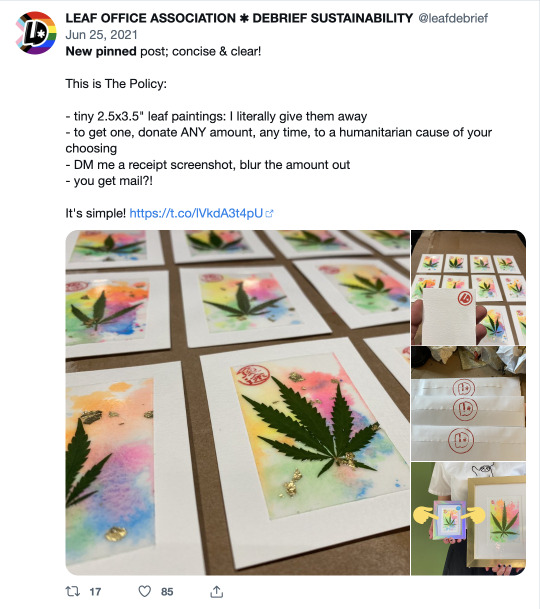
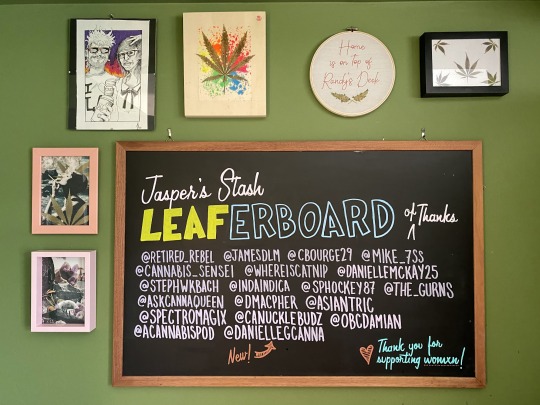
I was able to use my privilege to help others, and it felt great.
Over time the show grew to include a variety of different formats, and the material began to coalesce into repeated themes that almost formed a narrative of their own. It felt like Leaf Debrief was beginning to take on a life of its own, and I felt that with a little more time it might've grown into something that could actually make a difference by just following the momentum of this model.
That model was unfortunately damaged badly by the recent acquistion of the platform by Elon Musk, and resulted in a fragmentation of the community that I felt was beginning to form. The larger culture wars that have been raging on the platform for years have been exacerbated by the acquisition, and the platform became increasingly toxic and hostile to people I care about, while simultaneously adopting a less punitive approach to the people who were responsible for that toxicity and hostility and even rewarding them for it.
The business side of the platform began to take precedence over the platform itself to accommodate for the company's hemorrhaging of money, due largely to the new policies that drove advertisers away for fear of being associated with the toxicity and hostility. Eventually the model of the business took on a structure that was designed to exploit every aspect of the platform for profit, and I was left with a choice: continue to use the platform and settle for complicity in the toxic culture that was forming, or leave the platform and risk fragmenting the community further.
I chose the latter, and unfortunately it resulted in a significant loss of momentum.
The close group of people I felt strongly were working towards the same goal as me got swept up in disillusionment and most of them simply resigned themselves to the notion that the world is doomed and there's nothing we can do about it. This just drove me to work harder, but it also left me feeling increasingly isolated and alone due to the alienation I felt from the people I had previously felt so connected to, who were becoming increasingly intolerant of my aggressive push for action.
It was already clear to me that I was pushing too hard and too fast, but the urgency of the larger situation in the world—wealth inequality, climate change, and the rise of fascism—left me unable to slow down as all signs pointed to the need to speed up.


To make matters worse, the cannabis space itself was not the progressive utopia I had perhaps foolishly hoped it would be.
It was rife with the same problems that plague the rest of the world, and the people who were in positions of power were not interested in changing the status quo. My scope of influence was limited to the people who were interested in listening to me, but those people were completely exhausted by the constant barrage of bad news and were at this point just trying to survive.
I was trying to push them to do more and unable to understand why they weren't, and they were trying to get me to slow down and unable to understand why I wouldn't. It was a mess, and did a lot of damage to the relationships I had built with people I cared about. The results of those conflicts are consequences I'd already anticipated, but I was not prepared for the scope of the fragmentation that would result from the loss of our previous platform and rebuilding those relationships is an ongoing process that continues to be a challenge.
At the present, I'm left with a very small but very driven and dedicated group of people who are still working towards the same goal as me, and I'm trying to figure out how to move forward with them towards something that can actually make a difference but the scale of what I want to do is going to need more organization and structure than I can provide on my own.
I need help, and this is why I'm writing: to have a model of what I'm even asking for so that hopefully the process of figuring out how to collaborate will fall into place more easily.
The few people who are still working with me are all very busy with their own lives and I don't want to burden them with the task of figuring out what I need from them, and I'm wary of asking for too much from them because I don't want to risk losing them as well.
My partner Asia has been a huge help in this regard, and has been a constant source of support and encouragement throughout this entire process. Our lives recently have been more tumultuous as well though, and we've been constantly trying to find new ways to balance her need for stability with my need for change.
We've been trying to find new ways to work together that allow us to support each other while also pursuing our own goals, and it's been a challenge. We're both very passionate about the same things, but we're also very different people with very different needs and desires.
As of December 2023, Asia is also transitioning to a new job that will allow her to work from home or anywhere else in the world, which will hopefully allow us to travel more and focus on building new things, but will be taking a significant pay cut in the process which will put more pressure on me to find new ways to support us both comfortably and still have resources left over to dedicate to this project (which is still going to be heavily focused on providing resources to others who need them more than we do).

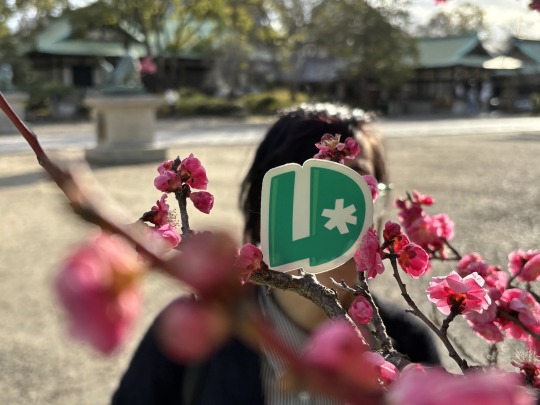
The scale of what's ahead of me is daunting to say the least, so I made a calculated move to take a step back from social media for the rest of the 2023 and regroup. I used that time to reflect on what I've learned so far and figure out how to move forward in a way that is more sustainable and less reliant on my own energy, while still continuing to produce high-quality content that both meets my goals and remains a source of fun and happiness.
I don't tend to discuss my own personal struggles publicly often, not because I am guarded about them but because everyone has their own and we're all struggling with how to navigate each other's. This does cause the occasional misunderstanding because I do tend to be very open about my thoughts and feelings, so it's easy to assume that I'm not struggling with anything at all.
I don't plan on changing that, but I do want to be more mindful of how I'm conducting this project so it more closely aligns with the goal of finding solutions to our shared struggles together while also being a source of fun and happiness.
This isn't a comeback or a rebirth, just a comedown and a rebrief. Maybe a rebrand too, but we're still working out the new brand materials. We hope you'll join us in the trash heap as we look for some shiny pieces to put together, we're gonna need lots of helping hands!
♡
Love, JXPR x AZA
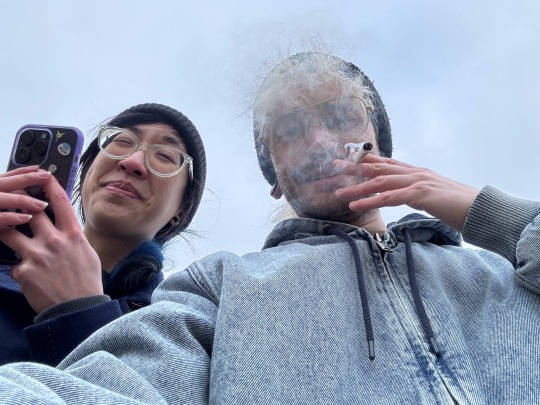
3 notes
·
View notes
Text
"The Fragile Nature of Truth Still Resonates

Munson (left) and Dewald at conference held in Herodotus' honor for the 2500 year anniversary of the Greco-Persian War. Photo by Laçin Karaöz
What useful lessons could a history of the Greco-Persian Wars written in 430 B.C. possibly have for us today? Several, if you ask Swarthmore’s J. Archer and Helen C. Turner Professor of Classics Rosaria Vignolo Munson and Carolyn Dewald ’68, professor emerita of classical studies at Bard College.
The two authored a recent commentary on Herodotus’ Histories, a text that has enjoyed a recent spike of academic interest (enough to spawn a Herodotus Helpline).
“Herodotus is called the father of history because [Herodotus’ Histories] is the first work of historiography that has actually survived in the West,” says Munson. “He's very important because he is the first one who wants to examine the causes of events in the past, like for example, why war happened, and why people win wars.”
Histories has it all: fact, fiction, betrayal, murder… and don’t worry if it’s all Greek to you.
“[Herodotus is] great at really just sliding in information to locate you so that you know what the point is going to be because you're given the background,” says Dewald.
Munson and Dewald have shown the same commitment to accessibility in their commentary.
“We took the Greek text of the first book and we made this commentary,” says Munson. “It is preceded by very full introductions to various topics Herodotus talks about, including the various people that he treats.” Line by line, they explain the Greek grammar, what it means, and offer interpretation and parallels.
Munson posits that the recent surge of interest in his work is because his exploration of the fragile nature of truth still resonates today. “He has come to the realization that memory is relative, and so sometimes he says, ‘The Athenians say this, and the Persians say this other thing. I really cannot tell which one of the two versions is right.’ He makes you aware of his research and of his efforts.”
Perhaps, in an era where misinformation proliferates rapidly, this level of transparency causes us to question how we know what we know and what makes us trust our sources.
And if we think respect for different cultures is a modern value, Herodotus proves us wrong.
“He is describing the expansion of the Persian Empire … they were a superpower, multi-ethnic empire,” says Munson. “He just stops and examines all the various peoples that the Persian had conquered. He says the custom is king of all, so whatever is one's custom, you have to respect it.”
Though Herodotus took pains to interview eyewitnesses and provide evidence for many of his claims, Histories includes figures from Greek mythology and a bit of his own moralizing.
“One of the things that he really hates is tyranny, the autocratic king, the dictator, the one who conquers other lands,” says Munson. “Very topical, especially now with the war in Ukraine. He would have a very clear position on that.”
And for those of us who grew up on folktales like The Tortoise and the Hare and The Emperor's New Clothes, Herodotus’ warnings about the dangers of hubris might feel familiar.
“In many cases, he shows that the reason why there is a downfall from great prosperity to not so great over time is because people have hubris, have pride, and they go overboard,” says Munson. “On the one hand, they are punished by the gods, but the way they're punished by the gods is simply by the fact that they start acting in unreasonable and self-detrimental ways.”
Some of his cautionary tales are still scandalous by today’s standards. Histories is rife with husband-murdering queens and sister-marrying kings.
“[Herodotus] went around and collected great stories,” says Dewald. “It's really fun reading.”
So, why still read such an ancient text? Because it has so many layers, there is always more to uncover.
“A lot of the stories are extremely funny in an extremely sly kind of way,” says Dewald. “I've been reading Herodotus for over 40 years, and I'm still finding things. ‘Wait a minute. Oh, that's a joke.’ But the joke always sends us to things that are pretty deep and worth thinking about.”"
From the website of Swarthmore College.
2 notes
·
View notes
Text
Thoughts On The Depp vs Heard Case From A Survivor
So, to give a little backstory and apologies in advance for the essay, I am a survivor of SA and abuse. Now, I was never in a relationship and abused; my story is much different. I will briefly mention p*dophila, so if that might trigger you, I’d stop reading after this paragraph.
I was sexually abused from the ages of about 7-10. I was abused by a family member who was also emotionally and verbally abusive and one who had many issues with alcoholism. He never hit me, though he was physically abusive to my brother. I grew up afraid of my own shadow, and I have a large chunk of my life and childhood erased. I was diagnosed with PTSD sometime last year when memories of the events reappeared in full force. I have zero proof, and I am far past the statute of limitations. I can’t give them any actual details, and I can’t talk or think about it for very long without dissociating or relieving that awful time. There is no way to receive justice, and I’ve come to peace with that. It’s shitty, but that’s life. I think a big part of me would be too afraid to anyway. I’ve never been able to have a relationship, and I have trust issues and walls so thick a wrecking ball couldn’t even tap them.
To address Elaine’s frankly despicable interview, many survivors support Johnny. I can’t explain it to anyone, but we recognise our own. There’s something in the way we talk about the event(s); it’s harrowing. It sits on your shoulders and recounting it feels like choking. So many of us cut ourselves off from the event(s) and try desperately to distract others by making jokes to draw attention away from the conversation. You could see that with Johnny, not with Amber. The way Amber behaved caused the jury to rule against her; she showed her true self on that stand. She was aggressive, recalled “everything” with crystal clear clarity, and got caught in lies multiple times. A biased judge also oversaw the UK case that she kept referring towards; (quick correction here because I was given the wrong information) his son was an editor for The Sun, so he wouldn’t rule against them, let’s be honest. The judge should’ve recused himself, but chose not to. The same man who owns The Sun also has claims in The New York Post and Vogue, two companies vocally against Johnny. Wonder why…
I strongly dislike how Amber Heard painted herself as a martyr; she does not represent us. We have overcome so much, and to have a liar spit in our face by appropriating our daily struggles is so beyond wrong. To claim the verdict is the jury saying, “Oh, we don’t believe you if you don’t have evidence”, is highly inappropriate for a lawyer, especially one “chasing her fifteen minutes of fame”, as she likes to say. Also, accusing the jury, that was holed up in a hotel room with no phone or internet access, of bias is bloody ridiculous.
She continues with this whole, “Oh, it’s a step back for women”, but it’s not. It’s a step forward for male victims, men are finally feeling comfortable enough to speak out, and that’s beautiful. We know women have been used and abused since the beginning of time, but we never talk about men. Men aren’t just abused by their Boy Scout leaders, priest, or boyfriends. They are also abused by women, a fact they are told to be silent about. I remember explaining to my fifteen-year-old employee that his first sexual experience being with his friend’s mother was not ok. He couldn’t get my point, even when I showed him how the role reversal would seem. It had been trained into him by toxic culture and media that women could not be predatory, women couldn’t be abusive. Any sane person will know that’s false.
I’ve connected with many male survivors during this case, a topic I’ve been passionate about since my youth. My abuser was abused; it’s an unfortunate cycle. Men are not given coping tools, just told to “be a man about it”, especially by women who believe men can’t be abused. Yes, I was as shocked as you might be that there are women mad enough to think that only one gender can be abused. They defend Amber purely in the name of “feminism”, which is entirely fake. I can only hope this case lets men know they aren’t alone; they can be heard. Women can’t be allowed to get away with abuse purely based on gender. We also need to stop believing every word that comes out of people’s mouths without any questions. People can’t just accuse others of heinous crimes, especially public figures if they can’t be honest about what happened.
If you’ve made it to the end here, I commend you; I’m very well known for my speeches- blame debate class 😅. All in all, survivors are pissed significantly because so many believed Amber. Those who didn’t were told that they were just in love with Johnny, which is just plainly untrue. Every Amber stan reflects their idol; aggressive behaviour, insults, demeaning survivors, and calling us liars. It’s tiring, it’s upsetting, and we can’t escape from it. I mean, it’s everywhere; there isn’t anywhere this topic hasn’t touched. I’m constantly hit by flashbacks from trauma that keep getting dredged up, and being open about it gets more complicated when civil conversations turn into personal attacks. Elaine and her team were incredibly unprepared and were extremely unprofessional. Johnny scored a rockstar roster and deserved every inch of his win. The message that needs to get across is that no matter what gender, race, or sexuality you are, you aren’t alone. There are millions of us worldwide that are proud of you. Proud of you for pushing through, being brave enough to tell your story, and for being strong enough to fight for the truth. We are not alone, we are a strong community, and we need to support those who go unheard. Victims come in all shapes and sizes, with different coping mechanisms and different personalities. Of course, there's no “perfect victim”, but Amber Heard has proved herself to be nothing but a narcissistic abuser who thought Johnny would never speak up. He has, and we have heard him. None of us should live unheard; no human being should be shunned for speaking their truth.
#tw: abuse#tw: molestation#johnny depp#justice for johnny depp#personal rant#amber heard#amber heard is an abuser#amber heard is a liar#me too#men too#support survivors#respect male survivors
49 notes
·
View notes
Text
yknow rewinding a couple of hours. something worth saying re: this
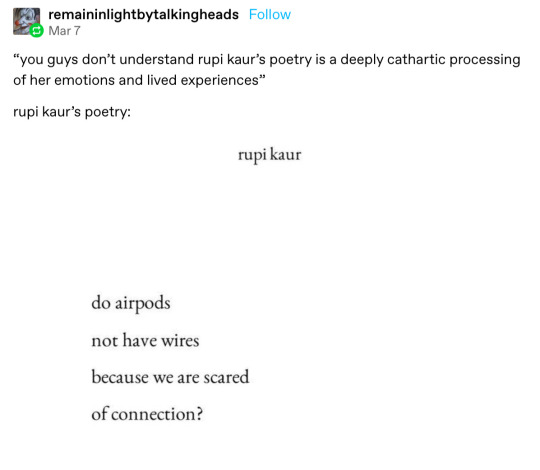
is that like, on one hand, rupi kaur does have the unfortunate position of being the go-to contemp bad poet example. and the people who are out here like “this is an outsized response to mediocrity which is determined in no small part by her being a young brown woman who came up on instagram” are onto something for sure. but you should never let that awareness stop u from recognizing her as a remarkably bad poet. there are poets who have done wonderful things with simple expression, with personal history and catharsis (i beat my drum in perpetuity for gwendolyn brooks. you might also look into for example “father’s bedroom” by robert lowell). there are poets who have done wonderful things in terms of making us question what counts as poetry, and why we should care about its boundaries and capacities. and there are many poets who have just been shallow and boring and relatively unskilled. like the above is the kind of thought that you could very genuinely make interesting if you had half a commitment to form and expression. for example, if you’ve read anything by zizek, arguably one of the foremost philosophers of our time, you’ve read his very famous thing on toilet hermeneutics, which you might express as a surface-level rupi kaur style poem in the following way: do toilets / whisk away our shit quickly / because we fear / to face our own refuse? and his answer is yes, and then he gets a whole lot of interesting if contestable cultural analysis out of it. like a haiku bot has more of a meaningful commitment to form than this, is my point. what’s made accessible or “democratized” here is just like, the barest possible bone of what a poem might be. it’s tiresome to insist that poetry is too rarefied to be accessible to the common man; poetry’s terms of access are rarely as simple as Wealth Leisure and Education. many foremost scholars of the novel, for example, are also not very good readers of poetry— and they have Wealth Leisure and Education in spades. (more valid, maybe, the way that attention is unevenly permitted.) at some point you simply must admit to yourself that you have confused abstract and challenging with inaccessible. there is not this much criticism and theory and philosophy out here because this material is, if you simply gather enough privilege in the form of social capital, really quite easy. the real answer is that many people simply do not care if what they are reading is good or effective poetry, and that they find forms of expression like rupi kaur’s to be meaningful in their own right, and that’s, you know, literally fine!
[caveat i guess is that i’m pretty biased against the poetry as self expression thing because i think it makes for some technically poor poetry; every time i’ve heard a poet i admire speak about their craft, they’re not talking about how they’ve found themselves getting realer or more vulnerable or more cathartic, they’re talking about how they grew in terms of technical skill and capacity. so i had to decide to get over the rupi kaur thing, because really she’s no poorer poet than anyone else who’s out here doing the social media house style thing where you just add line breaks to a series of purple prose struggle tweets— all of it’s fed by a desire to Do Poetry without any real interest in what poetry entails beyond a mirror of the self. and that’s like, fine, i probably find that more offensive than is normal. i’m cranky about mary oliver, who was a perfectly serviceable poet. but you can just SAY you don’t care about poetic merit but that this thing works for you in x y and z ways and just go on your merry way. i promise u.]
7 notes
·
View notes
Text
wings of fire ravings below they are in my head and have to get out
I'm LOSING IT GUYS every time I reread any wings of fire books and especially whenever I get to read them for the first time I am MIND FUCKING BOGGLED by how simply and carefully and cleanly and effectively and accessibly tui t. sutherland manages to make these insanely big, complex, important issues for the children who are the books' target audience. I grew up on wings of fire; I got the dragonet prophecy as a prize from our summer reading program when I was still in elementary school. I read a TON when I was a kid and this is the only book series that has retained its original impact and basic messages as I've grown and read it again. my understanding of the issues it walks you through was genuinely just about as accurate when I first read through as it is now. seraphina is my favorite book in the world, but it's not written for children, and I understood something new about it every time I read it again growing up. it's a completely different sort of narrative beauty. wings of fire talks about so many things like different kinds of families, different kinds of races and how their cultures may differ, mesh, and clash, what it's like to have or have friends with completely different talents, or even like. just birth defects or things supposedly wrong with you. so much of it is about what it's like to be a kid and for grown-ups to think you're not good enough, or have plans for you that you don't like and didn't ask for, or to dismiss you and your thoughts and feelings because of your age and inherent lack of world experience. just as much of it is about what it's like to then grow up to be the ones with that authority, and how empowering it feels to do things differently, and with kindness. it illustrates principles like absolute power corrupts absolutely PLAIN as day and eloquently as shit. animus power is one of the most unique and well-executed and incredibly fucking effective metaphors I've ever encountered in children's fiction, and like I said, I've read a LOT. it's vague enough early on and just so firmly ensconced within the entire series that people in the target age bracket can do a lot of the connecting on their own before it gets to its point. even when it does it doesn't feel preachy like some books do. it really just feels like something is being properly clarified that has been carefully set up for 11+ books, and it's satisfying as hell to have all the connections and judgements you've made based on all of it finally confirmed. and the emotional impact is fully relevant to the character the third limited pov is centered around in that book. don't even get me STARTED on the personalities that are illustrated in each of these books and how they each serve the plot in the most effective way exactly in the book they were chosen to narrate.
I'm starting to reread the third arc now so I can read the last two books for the first time in preparation to read them to my little sister, with whom I'm currently working through the last of jade mountain prophecy. we dive into the dystopian shit pretty hard in lost continent, and I'm just sitting here marvelling at how easily accessible she was able to make that for just like. elementary and middle school kids. I can't fucking believe it
#RARRRGHHHH#in unfathomable detail#wingsoffire#just word vomited all of this and i am sending it out into the world.#enjoy it or don't even look at it i don't care#i just. phhhgh my god#tui t. sutherland
7 notes
·
View notes
Text

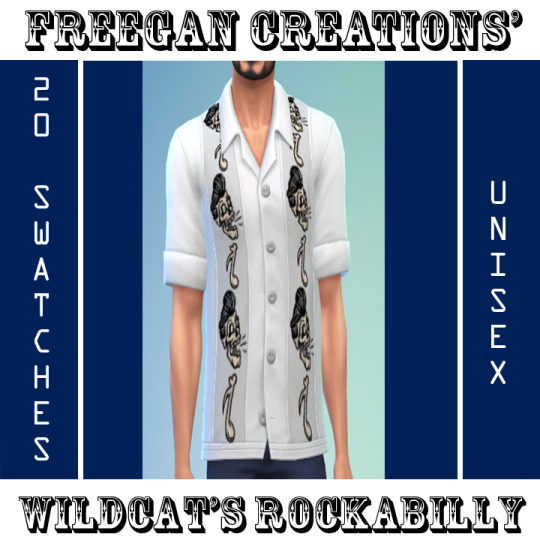
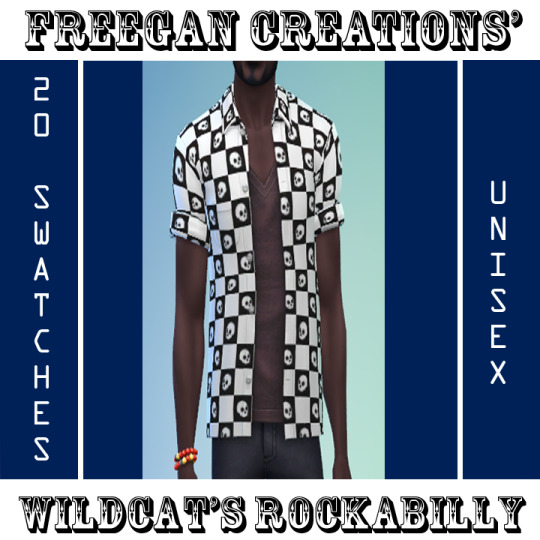
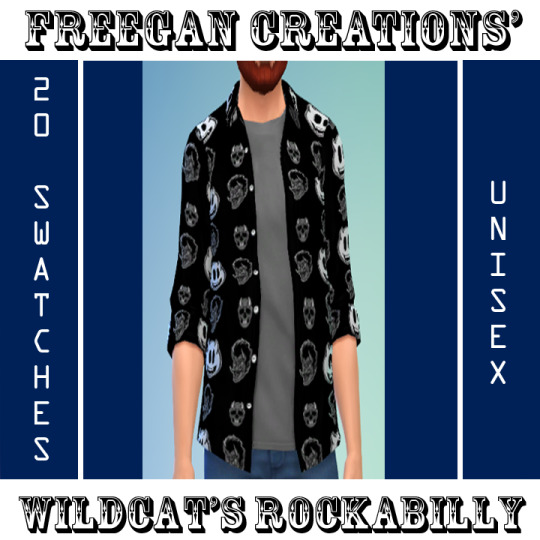

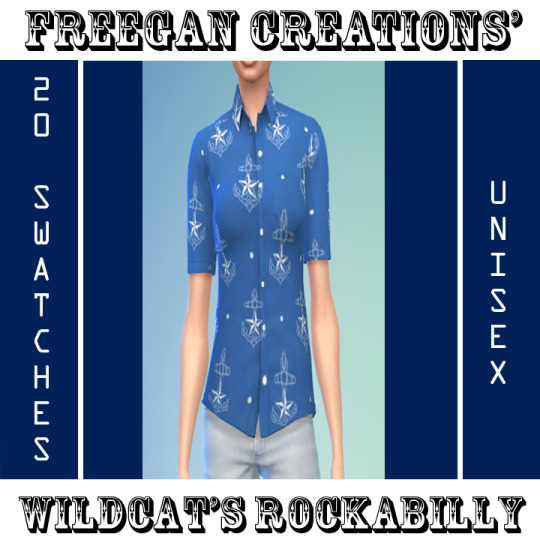
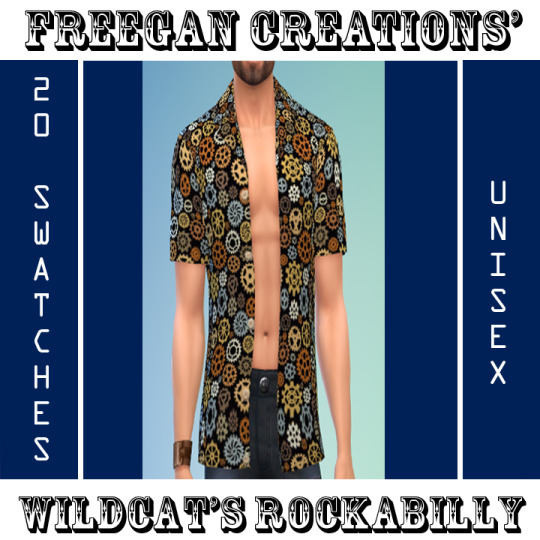
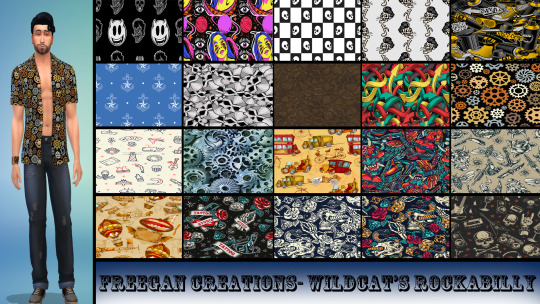
20 swatches.
You can find previews in the Example Photos. :)
These Item is Unisex and can be worn by all genders.
These Items wont randomize onto random sims. It will be your Sims personal item. If you place it, they wear it. No more Stolen Outfits! :)
My Dearest Freegan Babies,
Today I’d like to tell you about one of my favorite stores that played a decent part in my life. I grew up very low income. Thrift store vouchers were how I got new clothes every year for school, and when I grew up, thrift stores were never the place to be. It was seen as a disgrace in my small town to have to do that. For me, I thought of Thrifting as a magical place. I enjoyed looking at the clothes and imagining who owned them prior and what their life was like. It allowed me access into other cultures and environments I probably wouldn’t have experienced otherwise.
When I was in middle school, a girl in my class had gotten a new coat from a Goodwill by her house. She loved that coat and couldn’t wait to show it off before first period as we lined up and waited at the doors to be let in. This was our little runway, if you will… She was so excited that she showed it off to everyone walking by until the “Upper class” girls got in line. The snottiest of them noticed the Coat and announced to everyone that she gave that to Goodwill for the poor and that it was her jacket. She pointed out a stain she made on the sleeve and shamed the girl for getting something at the Goodwill bins. She made such a scene that the poor girl broke into tears and ripped off the coat... She threw it away and didn’t wear another one until Junior Year. It may sound extreme, but for her that was what pushed her over the edge. It was heartbreaking. A few of us tried to make it better, but there was no way of reaching her. She was too far into the rabbit hole of shame.
I, too, remember feeling this way, and knew that my number would come up one day. It did, but luckily the girl who donated was much kinder. She came up to me my Sophomore year and informed me that was her favorite jacket too, but it no longer fit. She told me how happy she was that it got a good home, and we scheduled a day to go Thrifting together. It was an unexpected friendship, and it was a time I needed a friend like that.
When I turned 16, I had finally saved up enough for a shopping spree at WildCats. It was a tiny Vintage store sandwiched between two abandoned buildings at this time, but it was on one of the main strips of Downtown. I remember trying to go for about 3 months, but I kept barely missing them due to my schedule. I remember walking in and feeling at home… I felt Safe. Soft, yet strongly written music was playing on the speaker system and the owner just let me explore. I found multiple items, and asked to try them on. I was thrilled when I found a Cherry print Halter Dress from the 1970s and a Leather Jacket in the back that fit my frame perfectly. It was a men’s small, and I asked why it was in the back. She said it was from an estate sale. The man who owned it in his 20’s had passed away of old age and the family wanted to donate it. I bought it instantly, and still have/wear it today. I like to think it’s my lucky jacket.
In the side pocket, there's an intentional hole torn in it that I didn’t find until a few years later. Inside was a little grocery list, a pack of Unopened Halls Cough drops, and a Folded up “lucky” bandanna. It was stashed in the lining to be kept safe, and I didn’t know the back story but I knew it was stashed away in there with love. So I kept it there. Whenever I wear my jacket and I feel anxious, I reach out and hold that bandanna in my hands and I don’t feel as alone. It was a small gift, and a small remembrance of a man I never met, but felt weirdly close to. I remember leaving my own tiny note for the next person who may receive this jacket after I’m gone, and I hope they find it. I hope that they feel how much love was put into that jacket, how many memories had been made, and I hope they make their own.
I mention this because as I was thinking about why I make CCs and why I’m trying to painstakingly make my own meshes; I can’t help but to think of all of you… I think of how many people have come to my page and found something they loved. I think about how many little moments I have been a part of by extension, and I feel nothing but love and pride to be a small moment in your life. I hope you know how much I care about all of you, and how much I hope that my little letters, little gifts, and my time spent is a sign that you are loved, and you are thought of. I know this world is hard right now, and I know things can get really rough. I hope you find your own lucky item that brings you comfort, and until then I hope my CCs remind you that some random stranger thinks about you every day. They wish the very best for you, and you are well wanted in this world…
Find your own Wildcats, Explore, and Love like there is no tomorrow.
Best wishes my Dearest Freegans! Be Good and Do some Good out there, Ok? We’re all in this together after all. <3
-Ashley J Williams, Freegan Creations
#sims#sims 4#sims4#sims4cc#simblr#sims 4 maxis cc#occult sims#the sims 4 cc#the sims 4#sims 4 cc#ts4#sims 4 unisex cc#sims cas#sims furniture#ts4 simblr#ts4cc#the sims cc#simmer#sims4cas#sims4recolor#curseforge
4 notes
·
View notes
Text
Years ago, I laughed at claims that Christian conservatives were dominionists in disguise, that we didn’t just want religious freedom, we wanted religious authority. Yet now, such claims are hardly laughable. Arguments for a “Christian nationalism” are increasingly prominent, with factions ranging from Catholic integralists to reformed Protestants to prophetic Pentecostals all seeking a new American social compact, one that explicitly puts Christians in charge.
The motivating force behind this transformation is a powerful sense of threat — the idea that the left is “coming after” you and your family. This mind-set sees the Christian use of power as inherently protective, and the desire to censor as an attempt to save children from dangerous ideas. The threat to the goodness of the church and the virtue of its members, in other words, comes primarily from outside its walls, from a culture and a world that is seen as worse in virtually every way. But one doesn’t have to look to national politics to see that threats can emanate from within the church as well as without. One of the most terrifying and poignant parts of the hit Amazon Prime documentary series “Shiny Happy People” was the story of Josh Duggar, a young man who was raised in a deeply religious family. He was protected from the corruption of the “outside world” in almost every way that could be devised. He was home-schooled and grew up in a house without a cable television and with limited access to media. And yet he was depraved enough to molest his own sisters.
…
My wife and I both grew up in a fundamentalist community that tried hard to protect the church from the world. Yet it turned out that my wife needed protection from the church. She’s a victim of child sex abuse. The perpetrator taught vacation Bible school.
This recent legacy of scandal and abuse should be more than enough evidence of the need for existential humility in any Christian political theology. This is not moral relativism. We still possess core convictions. But existential humility acknowledges the limits of our own wisdom and virtue. Existential humility renders liberty a necessity, not merely to safeguard our own beliefs but also to safeguard our access to other ideas and arguments that might help expose our own mistakes and shortcomings.
Who is wrong? I am wrong. We are wrong. Until the church can give that answer, its political idealism will meet a tragic and destructive end. The attempt to control others will not preserve our virtue, and it risks inflicting our own failures on the nation we seek to save.
3 notes
·
View notes
Text



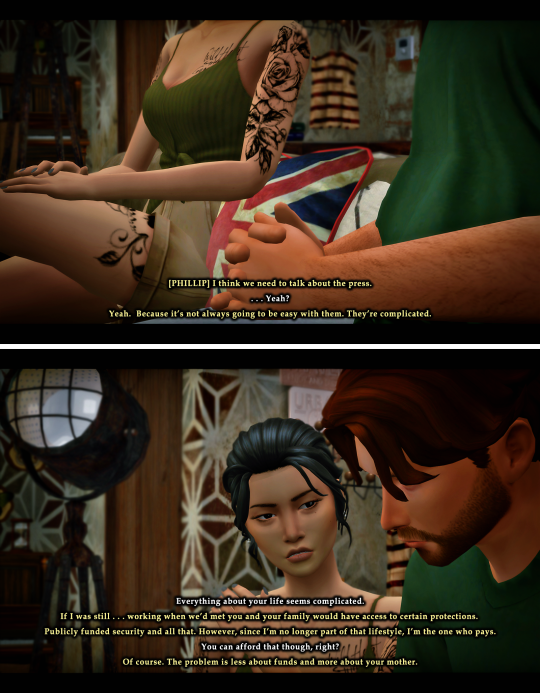
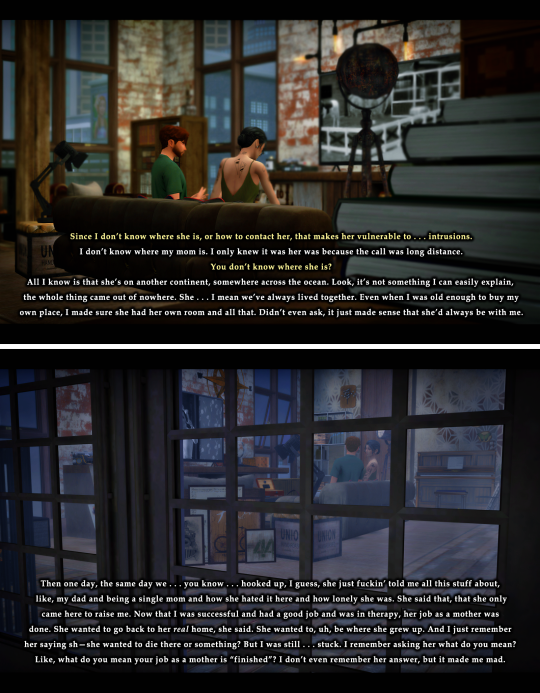
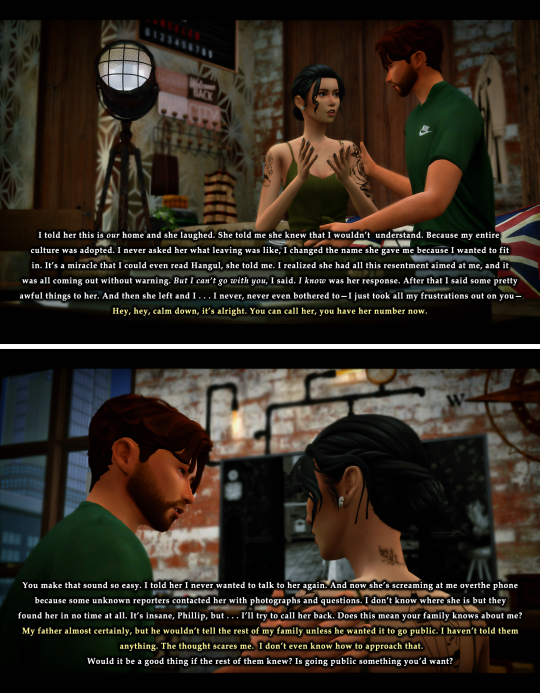
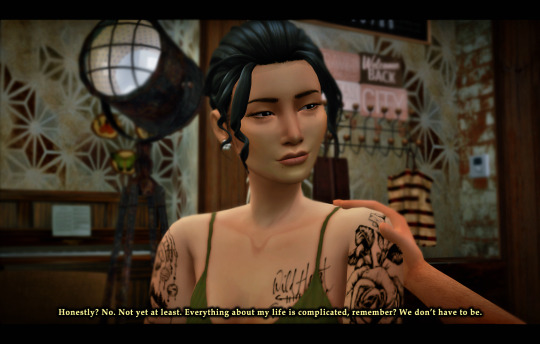
CHAPTER XXXVIII: FAMILY CONNECTIONS
Beginning | Previous | Next
Transcript under the cut - Click for HQ photos

AUTHOR’S NOTE: We are finally getting into what happened with Jean's mom. No, she's not an urn, guys, we can all relax with that knowledge in mind! As a child of immigrants, I relate to Jean a lot here. Sometimes you feel very disconnected from your family's heritage. You feel that you've been excluded or that your parent's culture doesn't fully represent your own experiences or perspectives. Sometimes you can feel as if those experiences were stolen from you. This is a big part of her character and we will get into it even more in the future.
PS - Also, Phillip is right that Louis 100% knows about Jean. He just doesn't think it's serious. Yet.
All likes, comments and reblogs are greatly appreciated! Thank you for the support 💜

[JEAN] What do you mean there are photographs? I—I don’t understand.
[JEAN] Who is contacting you? Isn’t it, like, two in the morning, —No! Don’t answer them. Don’t tell them anything!
[JEAN] I don’t know if it’s me because I don’t know what pictures you’re talking about! No—Mom, Mom, shut up—even if it is me, it’s not your business, do you understand me? You’re not going to control me from ten thousand kilo—
[ARGUMENT CONTINUES IN PYOJUNEO]
[PHILLIP] I think we need to talk about the press.
[JEAN] . . . Yeah?
[PHILLIP] Yeah. Because it’s not always going to be easy with them. They’re complicated.
[JEAN] Everything about your life seems complicated.
[PHILLIP] If I was still . . . working when we’d met you and your family would have access to certain protections. Publicly funded security and all that. However, since I’m no longer part of that lifestyle, I’m the one who pays.
[JEAN] You can afford that though, right?
[PHILLIP] Of course. The problem is less about funds and more about your mother.
[PHILLIP] Since I don’t know where she is, or how to contact her, that makes her vulnerable to . . . intrusions.
[JEAN] I don’t know where my mom is. I don’t even know how she got my number.
[PHILLIP] You don’t know where she is?
[JEAN] All I know is that she’s on another continent, somewhere across the ocean. Look, it’s not something I can easily explain, the whole thing came out of nowhere. She . . . I mean we’ve always lived together. Even when I was old enough to buy my own place, I made sure she had her own room and all that. Didn’t even ask, it just made sense that she’d always be with me.
[JEAN’ Then one day, the same day we . . . you know . . . hooked up, I guess, she just fuckin’ told me all this stuff about, like, my dad and being a single mom and how she hated it here and how lonely she was. She said that, that she only came here to raise me. Now that I was successful and had a good job and was in therapy, her job as a mother was done. She wanted to go back to her real home, she said. She wanted to, uh, be where she grew up. And I just remember her saying sh—she wanted to die there or something? But I was still . . . stuck. I remember asking her what do you mean? Like, what do you mean your job as a mother is “finished”? I don’t even remember her answer, but it made me mad.
[JEAN] I told her this is our home and she laughed. She told me she knew that I wouldn’t understand. Because my entire culture was adopted. I never asked her what leaving was like, I changed the name she gave me because I wanted to fit in. It’s a miracle that I could even read Hangul, she told me. I realized she had all this resentment aimed at me, and it was all coming out without warning. But I can’t go with you, I said. I know was her response. After that I said some pretty awful things to her. And then she left and I . . .I never, never even bothered to—I just took all my frustrations out on you—
[PHILLIP] Hey, hey, calm down, it’s alright. You can call her, you have her number now.
[JEAN] You make that sound so easy. I told her I never wanted to talk to her again. And now she’s screaming at me over the phone because some unknown reporters contacted her with photographs and questions. I don’t know where she is but they found her in no time at all. It’s insane, Phillip, but . . . I’ll try to call her back. Does this mean your family knows about me?
[PHILLIP] My father almost certainly, but he wouldn’t tell the rest of my family unless he wanted it to go public. I haven’t told them anything. The thought scares me. I don’t even know how to approach that.
[JEAN] Would it be a good thing if the rest of them knew? Is going public something you’d want?
[PHILLIP] Honestly? No. Not yet at least. Everything about my life is complicated, remember? We don’t have to be.
#warwick.story#chapter two point five#arc: happiness over everything#ts4 royal legacy#ts4 royal family#ts4 royalty#ts4 royal simblr#the sims 4 royalty#the sims 4 royal family#the sims 4 monarchy#the sims 4 royal simblr#ts4 monarchy#ts4 storytelling#ts4 story#ts4 screenshots#the sims 4 legacy#the sims 4 royal legacy#the sims 4 royal#the sims 4 storytelling#the sims 4 story#the sims 4 screenshots#ch: jean#ch: phillip#ch: ha-na#✨
32 notes
·
View notes
Text
Storytime: This thumbnail image of Kim Jaejoong sparked a 15-year culture and language study with 0 regrets!!!
My first 11 years were spent in a rural town of 4,500 people where Bass Pro was a lifestyle and the 4-H fair was the highlight of the year. (I am, in fact, my county's 4-H Greased Pig Capture Champion of 2019.) It was awesome.
Then, Youtube recommended THIS thumbnail for TVXQ!'s song "Hug". It pretty much changed my LIFE:

(Kim Jaejoong in 2003 for "Hug")
In my home and in my town, men were big, muscular, and macho--stubble, sunburns, fishing rods and hunting rifles, Mossy Oak baseball caps with clip-on fish hooks and cowboy boots. This one image of a soft, fairy-looking boy blew open a whole new realm of possibilities for masculinity. His hair is fluffy, not buzzed! He's wearing JEWELRY! He's got EARRINGS! And bangs!! He looks soft and clean and gentle, ethereal even!! And wow, can he SING! Not hard alt-rock like my dad liked or with a heavy country twang like on the radio--he sang sweetly and kindly, beautifully, in the magical new-to-me language of Korean. I knew guys were "tough", but I didn't know they could be BEAUTIFUL:
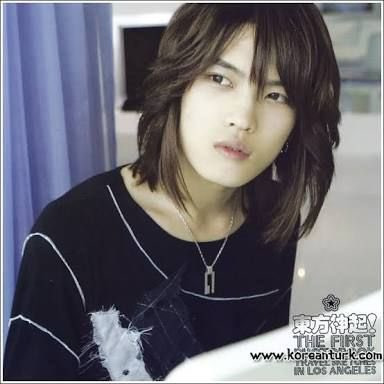

I became the first and only 11-year-old in my rural town (so rural we tried to ride the dairy cows for fun) to be obsessed with K-pop...back in 2008!!
Fast forward: The passion stays strong. My dad always wanted me to join the military, and so at 13 I joined the Navy ROTC. Thanks to a special appearance from a Marine drill sergeant who had come to give us a taste of "real" bootcamp, I burst into tears and fell out of formation. When the captain tried to comfort me by saying this was preparing me for what I wanted to do, I blurted back that no, actually, I want to teach English in South Korea!! That was the end of my short military career and my first declaration of my goal.
Although I continued listening to Kpop (and watching Kdramas, thanks to Jaejoong once more), I wouldn't pick up a Korean textbook until after--plot twist!--I'd studied Japanese for 5 years. (The anime wave hit my hometown far earlier than Hallyu did, so the self-study materials were far more accessible.) People in my town said I was the only one crazy enough to try learning Japanese and Korean at once, but I knew better: for the past 10 years I had been hearing Jaejoong sing beautifully in both those languages. (It had somehow never occurred to me that hadn't had to learn Korean from 0--ethnocentric habits die hard!) I pressed ahead with my self-studies nonetheless.
In my early 20's, I began teaching ESL online. I quickly gained a number of Korean students. Most were parents, small children, or working moms. I quickly fell in love with the "ahjumma" crowd. While I had already studied the Korean culture (not just pop culture!) in-depth, talking with so many families at so many stages in their English learning journeys unlocked new dimensions of its depth and richness.
In my mid-20's, my university recommended that I apply for a government program that sends students abroad for the summer to study one of 16 "critical" languages. I applied for Korean, citing my ESL experience, and was selected. Those two months would become one of the highlights of my life so far!
While in Korea, I didn't meet a beautiful ethereal fairy boy--and I didn't need to. By that time, I didn't even necessarily want to. Because while Jaejoong had caught the eye of my young self and sparked my initial interest, my love for Korean grew up just as I did. Of the many friends I made during my 2-month stay, most were my parents' age and the rest were my juniors in the womens' dorm. I experienced a vibrant culture both ancient and modern whose draw was in its own existence, and in the warm hospitality I encountered at every turn. I have never been happier! And, as a lovely little full-circle moment, while exploring the area around our dorm, I heard "Hug" playing from the speakers of a café.
The saga continues. I just passed round one of a scholarship competition which would send me back for another year...at long last, as an English teacher. (I also have backup plans in place if that fails.)
These days, when it comes to Jaejoong, I definitely think about him differently than I did as a child: I recognize sadly that his long time in the limelight from an early age was harmful to his physical and mental health. While I saw him as a glowing, magical archetype of an ideal man (gentle, non-threatening, beautiful, sensitive, clean and kind), I now think his real life was quite different from what he was pushed to portray. All through his life, he was carefully molded into an ideal star, always with an eye to the camera and a foot on the scale. These days, a common feature in his interviews is concerns with weight. That makes me sad and makes me feel bad about participating in the idolization that created that kind of complex. I didn't mean it that way, of course: realistically, I had no impact whatsoever on the situation in Korea at the time. However, I don't want my attitude to mirror the kind of toxicity that sets these celebrities up to fall. I want to make sure I balance enthusiasm for craft with the kind of respect and moderation that lets them remain human. These days, I hope he lives his life meaningfully for himself. I hope he can find who he is apart from the image he was dealt. Now he's 37: I wish him luck.
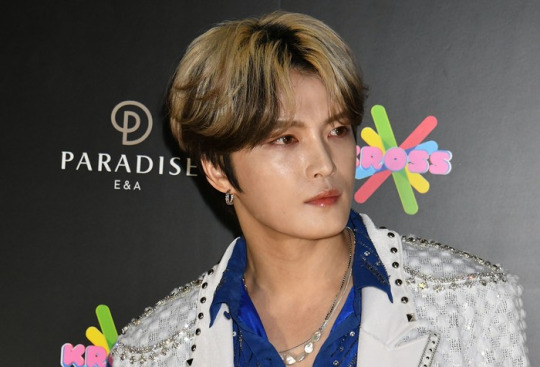

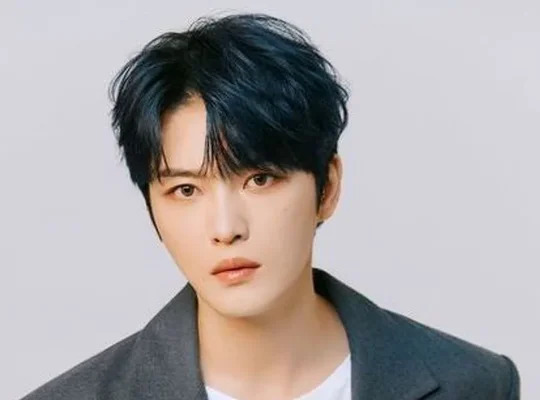
(JaeJoong in 2022-23 era)
Anyway, for why I thought about all that, I heard some of TVXQ!'s more obscure stuff for the first time in maybe 15 years, saw those old pics and got teleported back to middle school🥲 It's really been a ride!! And now I can happily report back to my young self that, just as we hoped, we did indeed learn Korean (even if we're only low intermediate for now, we'll get there!). Furthermore, when we made it to Korea, it was even better than we had dreamed.
6 notes
·
View notes
Text
ABOUT ME
I was born into a very traditional middle eastern family. We were always conservative (in a religious and cultural sense) but not so much in a political sense. When I am asked to introduce myself, I feel like plain facts do not define my experiences and perspectives. On paper, I am a 20 year old Bahraini girl born in Manama, Bahrain. But that is not enough. I feel as though I owe it on my journey in this course to provide a little more insight as to why I found this course to be one that appeals to me greatly.
Bahrain, like many countries in the Middle East, was a British “protectorate.” Which basically is a very nice way of saying we were colonised. And though unlike our brothers and sisters in East Asia, Africa and the Americas, this European intervention was not one that lead to genocide. They did not take our land. They did not physically harm our people. But to an extent, Eurocentricity and white supremacy became notions that were prevalent to those that were wealthy enough to access Western Educations, and so from then on elements of Eurocentricity lingered through generations, with no firm roots or evidence of any physical historical event where such ideas were enforced onto our people.
I was lucky enough to be born into a political family. I am grateful for the education that I accessed. However, there were benefits and drawbacks to the education that I accessed, being that I started off the first 14 years of my educational career going to the oldest British school in the country, that was established while Bahrain was under British protection. There was no way to describe it other than the fact that it was a little British bubble, on my tiny Island. The people in this bubble never cared to leave it. They were content being surrounded with their own people. Seldom did they think to interact with the local culture. They did the best they could to replicate Britain in Bahrain. A British colony if you will. I had to juggle between two worlds. The world where I existed as Aesha Al Jowder, the daughter of a prominent Bahraini politician, and that brown kid in class. No matter how talented I was, no matter how hard I worked, between the walls of any classroom I had to work “twice as hard, for half as much” as Michelle Obama put it, when describing her own experiences as a woman from a racial “minority” in the United States. It was such a small Island, and there were barely any other people of colour who shared my experiences during earlier years at this institution, so I had no one to relate to.
As I grew older, and became more exposed to different modes of media and culture, I began to see music as a form of release. In primary school, I had one teacher that was a woman of colour. She was my music teacher. It was from her that I first heard the old song, sung by enslaved Black People in the United States “Wade in the water.” Something about that song touched something deep in my soul. I do not in anyway compare my position of privilege to people who were entirely dehumanized and cruelly abused and marginalized into surrendering their rights to autonomy as members of an equal society, there was a lesson in that song. A desire to preserve the lives of others. There was expression. It was powerful, it was creative, it displayed a resilience of a woman of colour, who found ways to make her voice heard.
As I grew older, I consumed media from diverse sources. Obviously, American Media has a hegemonic sphere of influence over many parts of Asia, especially Gulf Countries. I grew up choosing to read American books, follow American news sources, look into American politics. But what really moved me was American music. I found that black artists communicated feelings of marginalization that I related to. And while it was nowhere near the same scale or extent, I would often find many rap songs from the likes of J.Cole and Kendrick Lamar to communicate feelings I harboured as a young woman of colour surrounded by blatant white supremacy. And it all comes from somewhere, American Music of all genres was revolutionized by Black people. It was arguably entirely created by Black people. Behind all the popular American music we listen to today, you will find black history. Music is such a powerful tool in informing and empowering the masses. Sound in itself is a great release, and it feeds one of our senses. There is a great comfort in consuming it, just so much as there is a comfort in releasing it. Music is something I am passionate about. This is why so many corrupt Islamic clergymen tried to prove that music was forbidden c. The Iranian revolution. It was a form of censorship that I, as a Muslim woman, can credit my British education to being liberated from.
My career aspirations align with creating social change and empowering my people. This is why I am an economics major. Economics is the study of scarcity, and how we as human beings react to it. And at the end of the day, colonization and slavery both happened with the intent of economically exploiting nations. And I just so happen to take a personal interest in how we as humans deal with these situations, and one of the greatest examples that comes to mind is the evolution of Black Music.
2 notes
·
View notes
Text
my generation, part 2
So much history, so much incident, and yet so little of substance has stuck in the collective subconscious of the Baby Boomers, let alone been carried forward by them. For thirty years, we have perceived ourselves, and encouraged younger generations to perceive us, as having been among the instigators of the ’60s ferment, those in whom its unarguable revolutionary and creative energies — not to mention its elusive ideals — coalesced, and yet our memories of that decade are remote, vaporous, and not quite real.
Most of us were too young to have been anything other than spectators in the early ‘60s, despite the saunter we feign now in late middle‐age as survivors and faux‐savants. True, we had been among the casualties at Kent and Jackson States, at Berkeley and several other American universities. We had been roughed up and arrested by police in Brisbane, Sydney and Melbourne. We had even hurled rocks and Molotov cocktails beneath clouds of noxious tear‐gas on the streets of Paris, Rome, Prague, Belfast and London — or of Watts, Hough, Detroit and Newark, where those of us who were black had come under fire from police and National Guards during bloody race riots between 1965 and 1967. In the end, though, they were not our battles. They belonged to the Silent Generation. We lent our support, if we were old enough, but we were on the periphery of most of the struggles, and our understanding of what was really at stake — however genuine our sympathies — was often incomplete.
Instead, we watched on television, and listened to the soundtrack on our record-players. We read eye‐witness accounts in Rolling Stone.
A generation born and raised in peacetime, during a prolonged period of economic well‐being (even in Europe, thanks to the billions invested by the USA under the Marshall Plan), Baby Boomers had no more certainty than the previous generation — forty years on, I sometimes relive the visceral chill of a seven‐year‐old’s terror of The Bomb: cowering with other children under desks during a Los Angeles school drill for a nuclear attack, air raid sirens wailing in the streets — but we were less inclined to hold strong beliefs, let alone agitate for change. We learnt to adjust, to be fluid, to “go with the flow”. In our mediated, proto‐virtual understanding of the world, everything was, and still is, fungible.
We dreamed instead. More than any previous generation of the twentieth century, Boomers had been raised amid the constant white noise and screen clutter of increasingly ubiquitous mass information, entertainment and communication media. By the late ’60s, the counter‐culture already had its own media, including magazines like Rolling Stone, New Musical Express and Creem, and aspects of it — all necessarily youth‐oriented — were being assimilated by the mainstream through films, TV and advertising. Gradually, we came to believe that these same media, with their McLuhan‐esque seductive power and their apparent free flow of images, information and ideas, rather than protest and confrontation, were the key to building the new world of our imaginations. It’s a notion borne out by the flood of Baby Boomers — among them Steve Jobs, Bill Gates and Timothy Berners‐Lee (all born in 1955) — who, since the late ’70s, have nourished an age of technological invention to rival the late nineteenth and early twentieth centuries, even if a genius comparable to Tesla or Edison is less apparent.
Baby Boomers preferred the surface of things, the context rather than the content. We were easily distracted. We grew up with the passive, low‐level attention required by ‘old’ electronic media such as TV, radio, film and recorded music to reading — one of the few things we still have in common with other, younger generations. We wanted easy access and the ability to switch between content (we already called it channel surfing) whenever our attention lagged — which was more often than we liked to admit.
Well before the benign effects of the early ’60s counter‐culture seeped into the community at large, we were drawn less to its ideals than to its image. For us, the medium wasn’t just the message: it was everything. For the rest of the century, the Baby Boomers’ unconscious reverence for Marshall McLuhan’s contention that a medium affects society not by the content it delivers, but by the characteristics of the medium itself was evident everywhere. The best entertainment (and advertising) for Boomers was, to use McLuhan’s own jargon, hot or data‐plenty, demanding less concentration but delivering ever‐greater effect. Social protest gave way to the profane. Rock concerts became ‘shows’, each an extravagant gesamtkunstwerk with complex staging and lighting. No longer happy to stand in one place and just sing or play as older performers did — even Elvis, who insinuated the snakey promise of hillbilly rutting into middle America’s subconscious, was still pretty tame — band‐members turned manic and feigned sex with a Fender Stratocaster guitar (or a half‐naked fan), destroyed a wall of speakers, or bit the head off a live chicken before swan‐diving into the crowd. Vinyl LPs were no longer two twenty‐minute sides of discrete, three‐minute songs, but multi‐disc concept albums that were almost Wagnerian in duration and structure.
The Boomers’ preoccupation with scale and spectacle at the expense of nearly everything else became apparent in other media. Steven Spielberg — born in 1946, the first of many successful Baby Boomer directors — turned his back on the sort of smart, unsettling, contemporary character‐driven dramas directed by Robert Altman, Francis Ford Coppola, Bob Rafelson, Martin Scorsese and others that had revitalised American cinema during the late ’60s and early ’70s to create Jaws, a film in which the main ‘character’ was a man‐eating shark, and any semblance of coherency in the narrative was subsidiary to the gradual amplification of suspense and the timing of set‐piece action sequences. Jaws was the first ‘blockbuster’ (a word only a Baby Boomer could love, meaning then a big‐budget Hollywood production that grossed over $US100 million in revenues in the United States alone). More importantly, it was a watershed in the entertainment industry’s perception of what the mass audience really wanted — excitement, the more intense the better. With uncanny intuition, honed during a decade of almost obsessive fascination with cause and effect in a variety of media, Baby Boomers knew how to give it to them.
It didn’t take long for this talent to be adapted as a means of exerting greater control. If the Silent Generation had been raised during times when the whole concept of control, let alone the means to exert it, must have been impossible to imagine – a sense of impotence was yet another compelling motivation for it to try to demolish the rickety postwar social order and establish something in which it could have some say — the Baby Boomers understood (as did the Roman Emperor Titus when he completed the Coliseum in 80BC and ordered that it be used for gladiatorial combat) that attention was a form of currency: acquire enough of it and you could transform it into real capital — which, in turn, gave you power.
And what better way to gain attention than by gaining the upper hand in entertainment media? It was an idea that would come into its own during the ’90s technology boom, when Generation X entrepreneurs, in harness with Boomer venture capital, would use the equation to leverage unimaginable value for their development of a new medium, the world wide web, inverting the idea of using fixed programming to capture the passive attention of a faceless mass audience of millions — the measure of value in old media — to create something a great deal more valuable, an infinitely customisable, two‐way interaction with a million‐fold audience of just one.
Control was — and still is — a big driver for Boomers. It underscored our relationship with the rest of the twentieth century, during which we tried to impose our views on others and to regulate their social and sexual behaviour with a zeal that smacked of a new Puritanism. We were stricter with our children, giving them less leeway to make their own decisions than our parents gave us. We were more ready to get involved in their education, or in any other area where we thought we might be able to exert influence on the shape of their lives. (To give us the benefit of the doubt, maybe we figured that if we didn’t, television would do it for us.)
The first of the Boomer legislators, judges and prosecutors were a lot less sympathetic and humanist than those of previous twentieth century generations. They were almost eager to limit or dispense with inconvenient legal and civil rights, impose stiff sentences or resort to the death penalty. As for Boomer politicians, if the Bush and Blair governments are anything to go by (their Silent Generation deputy, John Howard, could be said to be ‘aspirationally younger’), they are conservative, pragmatic, unethical, secretive and suspicious of free speech. They don’t much like the idea of a free press, either. Even if they are not as malignant as Bush, Boomer politicians can be little more than artful constructs (the former New South Wales premier, Bob Carr, springs to mind): a shiney, media‐friendly façade, a few well‐ turned, anodyne phrases and a lack of real empathy. All Boomer politicians have tried to cloak their legislative forays into social engineering as timely, well‐intentioned ‘modernising’ of existing political and social frameworks, but their version of modernity is always more intrusive, restrictive and careless of our rights.
There have been several Boomer political leaders who have tried to adhere to a more liberal, pluralistic and inclusive social philosophy, but there appears to be among them a disturbing propensity to engineer their own failure — as the former Australian Federal Labor party leader, Mark Latham (an on‐the‐cusp Boomer), appears to have done — or to self‐destruct. William Jefferson Clinton, the first Boomer to be elected President of the United States, and arguably one of the most intelligent and charismatic men to have occupied the Oval Office, ended up betraying the expectations of his generation because of a shallow preoccupation with what can only be described as ‘surface effect’, a disquieting moral ambivalence, and a tendency to self‐indulgent excess and hubris that are archetypal of our generation’s flaws.
At the edge of politics, straddling faded dividing lines between church and state, Boomers are among the most vociferous proselytisers not only for Christian fundamentalism — what better way for Boomers to exert control than through a belief system that behaves like an entertainment medium? — but, it might also be argued, for Islamic fundamentalism as well (Iran’s Islamic President Mahmoud Ahnadinejad, born in 1956, and Osama bin Laden, born a year later, are notable examples). Whatever side of the political, religious or cultural fence they’re on, Baby Boomers have a predilection for dogma that stems from their discomfort with — and inability to control — the confusion and contradictions of the times through which they have lived.
Even before the last Baby Boomer came of age — at eighteen, not twenty‐one, entitled to vote and drink — we had stepped out of the long shadow of the Silent Generation, looking for the main chance. We were never really idealists: we were — and still are — innately selfish and cynical (if not downright hypocritical). We focus on achieving a semblance of order, of control — we like to get the façade just right — in the context of right now, but we tend to overlook what it might cost us in the future. The idea that just because something can be done doesn’t necessarily mean that it should doesn’t occur to Boomers. Maybe it’s another indication of our hubris, but we don’t waste much time thinking about consequences.
The Magic Christian, a film directed by Scotsman Joseph McGrath, was released in 1969, the same year as Easy Rider. Adapted by the American satirist Terry Southern from his novel of the same name — Southern also cowrote Easy Rider with its stars, Peter Fonda and Dennis Hopper — The Magic Christian was an absurdist comic fantasy starring Peter Sellers as Sir Guy Grand, an Englishman of egregious wealth and a wicked sense of irony. Grand adopts a naïve, homeless young man, played by The Beatles’ drummer, Ringo Starr, to be his heir, renaming him Youngman Grand. He instructs Youngman in the operation of the “family business”: exposing and exploiting in most lurid ways the unquenchable greed of everyman. In one of the film’s funniest — if least subtle — moments, Sir Guy fills a swimming pool with excrement and tens of thousands of dollars, then invites passers‐by to retrieve as much money as they want. Soon the pool is overflowing with people fighting each other for fistfuls of cash as they struggle to keep their heads about the foetid shit, all under the gaze of a bemused Sir Guy and a troubled Youngman: “Grand is the name, and, uh, money is the game. Would you care to play?”
Indeed we would.
Film supplanted literature in the late ’60s (if not comic books, which we reconceived as ‘graphic novels’ to market them to a younger generation) as the repository of all our myths and parables. The medium appeals to restless Boomers because it enables us to rework these narratives from time to time. Eighteen years after the premiere of The Magic Christian, Sir Guy and Youngman Grand were transformed into Gordon Gekko, a rich and ruthless corporate raider (played by a middle‐aged Michael Douglas), and Bud Fox, a young if not‐so‐innocent stockbroker Gekko sets out to corrupt (a still fresh‐faced Charlie Sheen), in Wall Street, American director (and Baby Boomer) Oliver Stone’s celluloid eulogy over the fresh corpse of a decade notorious for its avarice and self‐interest. Boomers don’t like to acknowledge it any more (maybe, in part, because it reminds us of just how old we are now), but the ’80s were our best of times. The stern, Boadicea‐like Margaret Thatcher in the United Kingdom, and the doddery, paternalistic B‐movie actor and pretend‐cowboy, Ronald Reagan went out of their way to reassure us that the worst aspects of our generational character, the very traits that still grated on the Silent Generation, were not just OK but desirable in a world in which old‐fashioned values like ambition, self‐interest, wealth, privilege, heartlessness — oh, and empty‐headed celebrity — had made a comeback. The decade’s bible (or, as another writer would have it, Yuppie porn), was Vanity Fair, a glossy magazine edited by the Baby Boomers’ own brainy It girl, Tina Brown.
Even the collapse of the stockmarket on October 19, 1987 — so‐called Black Monday, when the New York Stock Exchange suffered its steepest‐ever one‐day decline and stripped the Dow Jones Industrial Average of nearly a quarter of its value (by the end of the month, the Australian stockmarket had lost over forty per cent of its value) — couldn’t deflate our confidence. Within a decade, Boomers would set in motion another bubble in stockmarket values, this time partnering with tech‐adept geeks of Generation X — our myriad neuroses and obsessive compulsive tics an unlikely match with their tendency to Attention Deficit Disorder and Asperger’s‐like syndromes — to conceive a New Economy, an alternative system of values underpinned by an entirely new medium of communication, information, interaction, transaction and entertainment.
It was a quartet of Silent Generation scientists at the US Defense Advance Research Projects Agency — Lawrence Roberts, Leonard Kleinrock, Robert Kahn and Vincent Cerf – that developed the technology and architecture to interconnect remote computer networks and thus create the internet, although it was a Baby Boomer, Timothy Berners‐Lee — an Englishman working at the European Organisation for Nuclear Research (better known as CERN) – who came up with something he called the world wide web. The far‐reaching revolution inherent in Berners‐Lee’s creation was at first lost on his peers (including the hyper‐intelligent head of Microsoft, now the world’s wealthiest individual, Bill Gates), so it was left to a younger generation — the Xers, whose very namelessness reflected a disconsolate sense of being a generation adrift, disenfranchised from a mainstream economic and cultural agenda now dictated (or, more accurately, obscured) by Baby Boomers — to recognise the liberating possibilities of the web’s capacity to interconnect not just documents — text, static images and, later, sound and video — but also ideas.
The Boomers were never big on originality. We were, after all, the generation that invented technology to make the appropriation or ‘sampling’ of anything as simple as a few keyboard strokes on a computer. We were good at refining existing ideas — the World Wide Web was a case in point, so too were the first iterations of Microsoft’s DOS operating system — but what we were, and still are, best at was hype. Our aptitude for effect — the gesamtkunstwerk of those ’60s rock shows — allied to our almost forensic absorption of mass media over the previous forty years meant that we were well prepared for the ’90s dot.com boom. Most of us were less interested in the web’s technology than we were in devising its business models (where, almost instinctively, we sensed the real power would be) and articulating the precarious value equation that turned attention into cash. Nonetheless, the early years of internet entrepreneurism were the apotheosis of the Boomer generation. Too bad that they resurrected in us an ethos that had tainted us during the previous decade — excess in all things, especially greed.
In Wall Street’s best‐remembered scene, Gordon Gekko confronts the restive shareholders of the fictional corporation, Teldar Paper, to convince them to sell off the company’s assets. With the fervour of a TV evangelist leading his congregation in prayer, Gekko tells them: “Greed ... is good. Greed is right. Greed works. Greed clarifies, cuts through and captures the essence of the evolutionary spirit. Greed, in all of its forms – greed for life, for money, knowledge – has marked the upward surge of mankind and greed, you mark my words, will not only save Teldar Paper but that other malfunctioning corporation called the USA.” This wasn’t just another of those cinematic moments that resonated briefly in the media‐sensitised subconscious of Baby Boomers before receding into the ambient low‐frequency noise. Gekko’s words became our mantra (Greed is good. Greed is right. Greed works.) They permeated our attitude for the next twenty years.
The irony is delicious: Baby Boomers turned out to be the Sir Guys for at least two generations of Youngmans.
Part two of three.
First published as part of a single essay in Griffith Review, Australia, 2006.
3 notes
·
View notes
Text
March 1 2023 Barcelona

Bruce and I have enjoyed living in the metropolis of Barcelona these last nine years even more than we imagined we might. We were accustomed to living in the small city of Boulder near mountain parks and forests of for most of our life together, and before that I lived in small towns and cities in Massachusetts, while Bruce grew up in a medium-sized city, Colorado Springs.

When we moved to Barcelona to live abroad and improve our Spanish, we began living in an apartment instead of a house, we began walking everywhere because we didn't want to have a car, we took advantage of cultural activities, and we made friends much faster that we thought we might. We totally fell in love with this place, the lifestyle, and the people here. Also, living across from the beach was something we hadn't expected to happen but turned out to be an added benefit.

So when we had the opportunity to buy the apartment we had rented for two years we decided, since we were already living in Barcelona and Boulder half time, to make the commitment. We really like our apartment and the views of the beach and the city that we have. It's spacious enough for us to entertain and to welcome visitors to stay with us, which we have done quite a bit. But the outside terrace never quite worked out for us the way we thought it could so we redesigned the space and had glass installed over the last few years that has nearly doubled our living space. By enclosing the space near the kitchen we created an "outside" dining/entertaining space which can be used even in the winter. Before we enclosed this space with glass it was too windy and cold much of the year to eat out there, even in the summer.

By enclosing the space off our bedroom with a door onto the terrace we created a quiet, peaceful meditative space that also keeps the bedroom warmer.

By leaving the space in between the two new "rooms" open we have fresh air on the terrace throughout the year and the hardier plants still do well out there. Also, if any of our friends who smoke visit, they have a place to go without bothering the other guests.


The guest bedroom has its own exit onto the terrace and guests don't need to come through the rest of the house to go out to the outside dining and living spaces.

It took a long time to design and implement these changes and it was a LOT of work, especially for Bruce, but it was worth it and now we have a home that is more comfortable for us and our guests. So when are YOU coming to visit?

March is National Women's Month in the United States. This presents us with an opportunity to celebrate the many women who have made so many important and amazing contributions to our country and our culture. If not for the Patriarchy there would undoubtedly have been even more opportunities for women to have equal access to education, employment, and capital, which would have put more women in positions of leadership and responsibility outside the home and we'd have a LOT more women's names to add to the list of those we now know and appreciate. Because for centuries the Patriarchy limited women, largely, to having children and supporting their husband's dreams, many women did their dreaming, scheming, and pursuing their passions in secret or "on the side". Thankfully the world has changed a lot in the last fifty years and there are more opportunities all the time for women to make a difference and be rewarded and acknowledged. Here are only a few of the most famous who succeeded:

Louisa May Alcott (1832-1888). Alcott worked to support her family through financial difficulties at an early age, and managed to write “Little Women,” one of the most famous novels in American history. Her other famous writings include “Little Men” and “Jo’s Boys.”

Susan B. Anthony (1820-1906). Anthony played a pivotal role in the women’s suffrage movement. In 1878, she and co-workers presented an amendment to Congress that would give women the right to vote. In 1920, Sen. Aaron A. Sargent, R-Calif., introduced the bill and it was ratified as the 19th Amendment to the Constitution.

Amelia Earhart (1897-1939). Earhart, the first female aviator to fly solo across the Atlantic Ocean, received the U.S. Distinguished Flying Cross for her accomplishments. Earhart and her navigator, Fred Noonan, disappeared in 1937 over the central Pacific Ocean while attempting to fly around the globe.
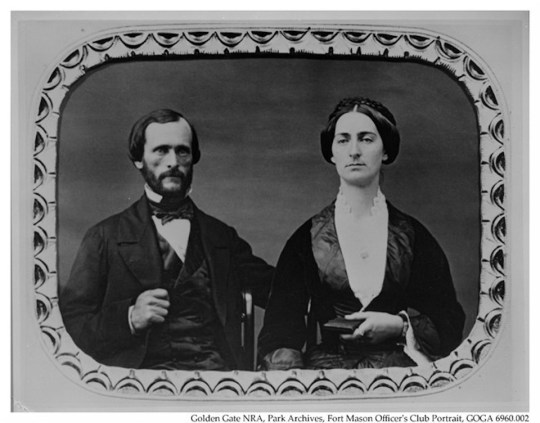
Jessie Benton Fremont (1824-1902). Fremont was a writer and political activist. She was considered the brains behind her husband, John C. Fremont, and his famous exploration westward. She turned his notes into readable books and made connections in Washington, D.C., that eventually made him famous.

Marguerite Higgins (1920-1966). Higgins was a reporter and war correspondent for the New York Herald Tribune during WWII, the Korean War, and the Vietnam War. She advanced the cause of equal opportunity for female war correspondents and was the first woman awarded a Pulitzer Prize for Foreign Correspondence in 1951.
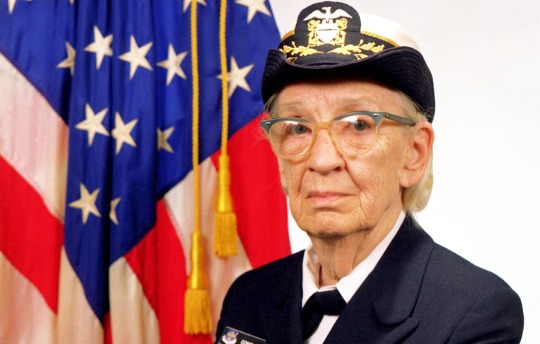
Grace Hopper (1906-1992). A computer scientist and Navy rear admiral, Hopper played an integral role in creating programs for some of the world’s first computers.

Julia Ward Howe (1819-1910). Howe was a poet and author, her most famous work being “The Battle Hymn of the Republic.” She was also a social activist for women’s suffrage.

Barbara Jordan (1936-1996). Jordan was a lawyer, educator, politician, and civil rights movement leader. She was the first southern African-American woman elected to the U.S. House of Representatives and the first African-American woman to give a keynote address at the Democratic National Convention.

Coretta Scott King (1927-2006). The wife, and later widow, of Martin Luther King Jr. played an important role in preserving the legacy of the civil rights leader. Following his assassination in 1968, she founded the Martin Luther King Jr. Center for Nonviolent Social Change. She later lobbied for her late husband’s birthday to be recognized as a federal holiday.

Michelle Obama (1964-present).
First African American First Lady (2009–17), the wife of Barack Obama, 44th president of the United States. Raised on the South Side of Chicago, Obama is a graduate of Princeton University and Harvard Law School. In her early legal career, she worked at the law firm Sidley Austin where she met her future husband. She subsequently worked in nonprofits and as the associate dean of Student Services at the University of Chicago.

Sandra Day O’Connor (1930-Present). A lawyer, O’Connor became a celebrated judge and eventually the first female justice on the Supreme Court, serving from 1981-2006. President Ronald Reagan appointed her.

Rosa Parks (1913-2005). Parks was the most prominent female face of the civil rights movement. In December 1955, Parks refused to give up her seat in the “colored section” of a bus to a white man and was charged with civil disobedience. She is known as “the mother of the freedom movement.”
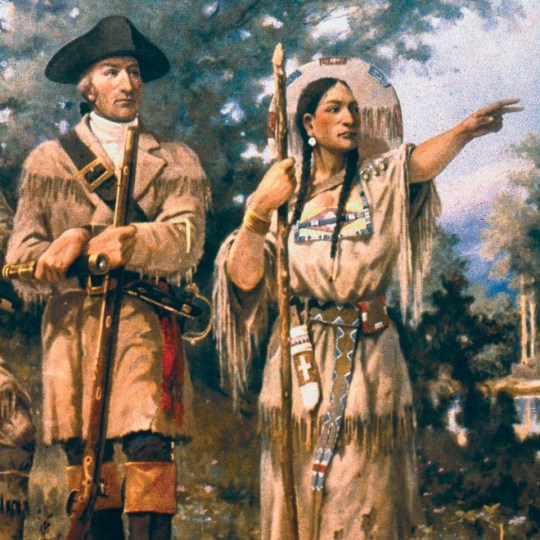
Sacagawea (1788-1812). Sacagawea was a Lemhi Shoshone woman best known for her expedition with Lewis and Clark through the territory of the Louisiana Purchase. The Native American traveled from North Dakota to the Pacific Ocean with the explorers.
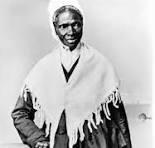
Sojourner Truth (1797-1883). An abolitionist and women’s rights activist, Truth was born into slavery and escaped with her infant daughter to freedom in 1826. She became best known for her “Ain’t I a Woman?” speech on racial inequalities in 1851 at the Ohio Women’s Rights Convention.
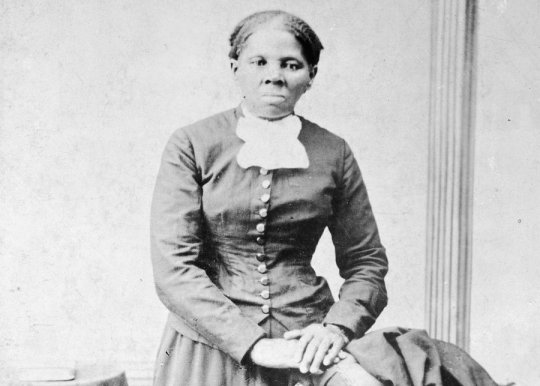
Harriet Tubman (1820-1913). Tubman escaped from slavery in 1849 and became a famous “conductor” of the Underground Railroad. Tubman risked her life to lead hundreds of slaves to freedom using that secret network of safe houses.

Mercy Otis Warren (1728-1814). Warren was a writer and propagandist of the American Revolution. She published poems and plays that attacked the British empire and urged colonists to resist Britain’s infringement on their rights.

Today Claire and I had our French class at her apartment. Her cat, Beuni, is really cute but shy. It took a long time for him to come out to say hi to me, even though he knows me pretty well. When I'm in Boulder we have our classes on ZOOM so he at least hears my voice when I'm not here.
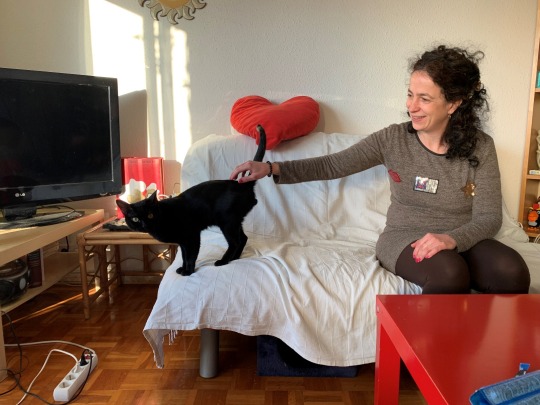
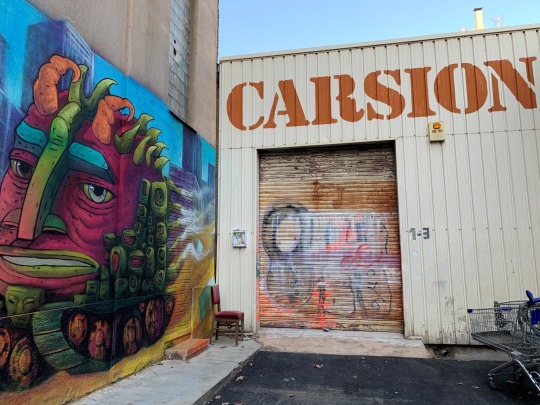
Walking back from Claire's apartment I noticed a number of murals along Selva de Mar Street so I stopped to capture some of the images.
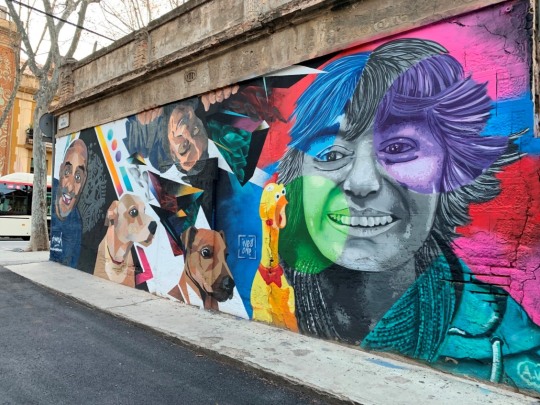
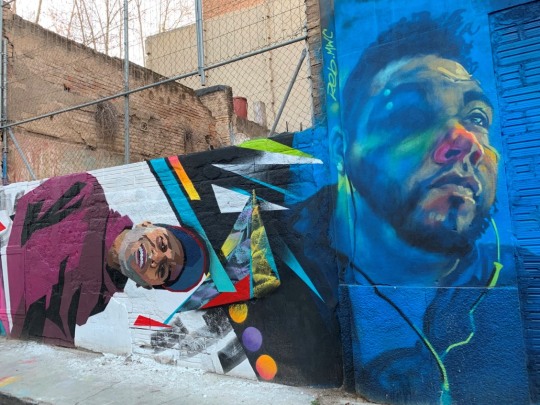
0 notes
Text
I’m nervous about the creeping expansion of “trauma”. On the one hand, it’s good that people who feel traumatized by things can have access to trauma-related resources and have other people respect/validate their suffering. On the other, it might be dangerous to create an expectation of traumatic consequences for minor wrongs.
Ancient warriors apparently didn’t get PTSD. Everything about this claim is still controversial, but the explanation that makes the most sense to me is that they had a narrative in which war was heroic and inspiring, not traumatizing. I think this story is backed up by cross-cultural comparisons and research on depression: thinking you’re supposed to feel traumatized is a risk factor for problematic trauma symptoms.
So this theory is dangerous even if it’s true: it might make people feel more triggered by political disagreements and less able to laugh them off. On the other hand, I don’t really see a lot of people laughing off political disagreements now. Maybe we’ve already maxed our our ability to feel traumatized by political stimuli?
...In my personal narrative, this is why I don't view B as an 'underdog', or 'poor little me'.
Moreover, these societies tended to have rituals surrounding the transition out of war. There were ritual purifications for a Greek or Roman army returning from battle. Offerings to be made to the gods for survival or triumph. Priests who could tell you “if you are bothered, do this and it will be ok.” In the medieval world too, there were religious experts who could tell you the rituals necessary to come back to a right relationship with both God and your society. Of course many veterans turn to religion for comfort, but most modern religious traditions respond with the same ‘yes, but…’ and ‘necessary evil’ approach. For the Roman miles or the medieval knight, there was no such ambiguity: do these rituals and all is well. Placebos are powerful and I suspect that sort of thing also aided the transition from war to peace, providing a sense of closure that it is hard for our societies to provide (I suppose the Roman would merely suggest that we were foolish to stop doing rituals which had obviously worked so well).
This interests me so much, because I grew up and was raised Atheistically. My family allowed me freedom to choose religion as I wanted.
At the same time, I seem to have a lot of respect for a story. I don't like saying, "But this isn't real!"
At least, for my own stories... The characters are real people, to me.
I had a dream last night that Jesus saved me from a burning house. If I had called on Him earlier, perhaps there would have been less carnage.
Even despite knowing all these scientific facts... it's the ability to weave them into a story that makes them useful, in my mind... Perhaps I have a narrative-driven mind. I've studied several religions. I like studying religion, it's interesting... but I had a 'break', where I remembered all my prior research on self-hypnosis and the power of suggestion.....
I also remember that I have enough respect for a story that I don't tear down the stage-sets. It's a magician's box, and it works for some people, and it's worked for me in many ways... but I have this rational grip on myself.... perhaps just like:
For example, more scientifically literate people are more likely to have partisan positions on science (eg agree with their own party's position on scientifically contentious issues, even when outsiders view it as science-denialist). If they were merely biased, they should start out wrong, but each new fact they learn about science should make them update a little toward the correct position. That's not what we see. Rather, they start out wrong, and each new fact they learn, each unit of effort they put into becoming more scientifically educated, just makes them wronger. That's not what you see in normal Bayesian updating. It's a sign of a trapped prior.
Political scientists have traced out some of the steps of how this happens, and it looks a lot like the dog example: zealots' priors determine what information they pay attention to, then distorts their judgment of that information.
So for example, in 1979 some psychologists asked partisans to read pairs of studies about capital punishment (a controversial issue at the time), then asked them to rate the methodologies on a scale from -8 to 8. Conservatives rated the pro-punishment study at about +2 and the anti-execution study as about -2; liberals gave an only slightly smaller difference the opposite direction. Of course, the psychologists had designed the studies to be about equally good, and even switched the conclusion of each study from subject to subject to average out any remaining real difference in study quality. At the end of reading the two studies, both the liberal and conservative groups reported believing that the evidence had confirmed their position, and described themselves as more certain than before that they were right. The more information they got on the details of the studies, the stronger their belief.
This pattern - increasing evidence just making you more certain of your preexisting belief, regardless of what it is - is pathognomonic of a trapped prior. These people are doomed.
The way the human mind works... an unwritable code, because once it is written down... it becomes this kind of fodder for priorism. Something beyond...
Oh, why do I turn to literature to explain myself.. when I am a breathing human being?
0 notes
Text
ACADEMIC BLOG POST 3- The Transmedia to End Them All
Homestuck is a vast piece of media. If you haven't read it or heard of it, you've probably encountered it through cultural omosis, such as seeing folks painted grey at a comics convention, using the term "god tier", or even seeing leetspeak in the last 10 years. I'd like to take the time to detail just how massive this project is, and to lay out why cultivating one's own transmedia can bring people together.
Figures 1 and 2- first and one of the last panels of the comic.
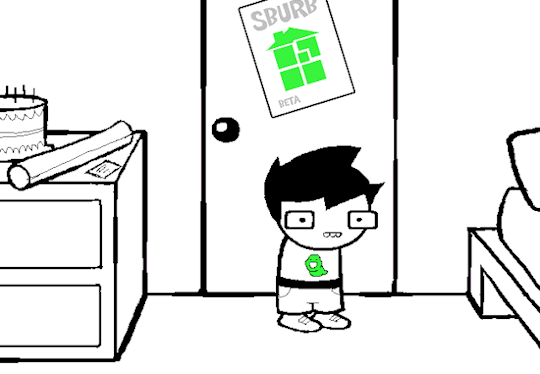

Homestuck is a webcomic that starts with 4 kids who get stuck in a video game, drawn in a relatively simple visual style. A simple concept that grew into an incomprehensibly huge conglomeration of information (it did the multiverse before the multiverse was cool), with the word count alone being upwards of 800,000 words. At first, all panels were drawn in Microsoft Paint-- as the comic progressed and gained more fans, slowly the rare Flash animations began to feature fan songs. Eventually, author Andrew Hussie would allow a great deal of fan involvement in Homestuck's art direction, making Flashes into little games and eventually developing a separate game in the same universe called Hiveswap. The fanbase grew so massive that even the extremely long comic and various other offshoot projects wasn't enough content for them. Fan spaces would organize zines and even make spinoff comics of their own, as in the case of the popular Vast Error. The comic made up a huge, if niche, corner of the internet, bringing people together to talk about fan theories, critiques, and love for a series like no other.

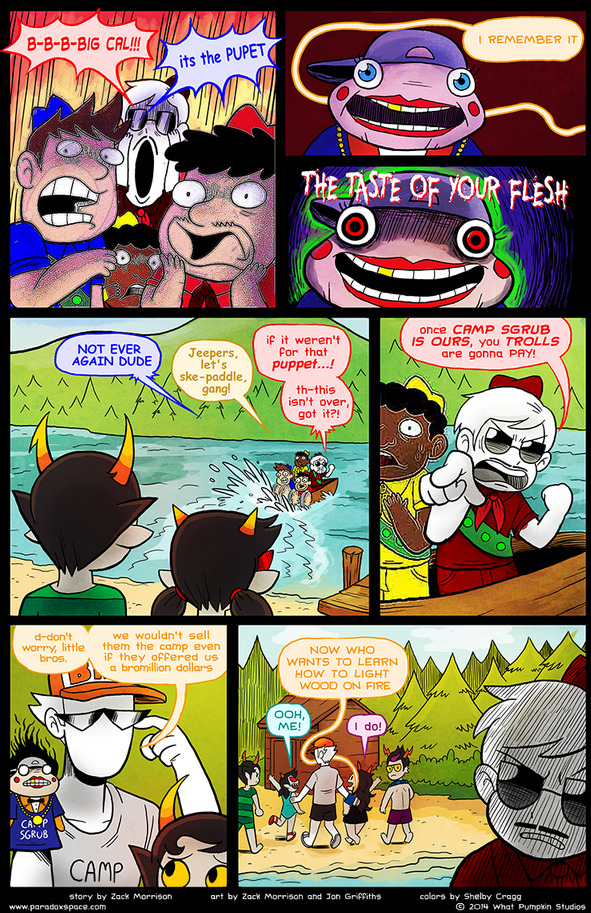
Figures 3 and 4- The title page of fan comic Vast Eror, and a page from one of the Paradox Space semi-canon comics
All good things come to an end... or they keep persisting despite themselves. While the original Homestuck comic came to a close in 2016, author Andrew Hussie kept creating related material. Hiveswap wasn't the only game in question released; Though Hussie eventually lost sight of the vision he was trying to achieve with Homestuck, the wealth of a world he and his fans created was one of a kind.
When we create and publish artwork, we cultivate a space to engage with it. Homestuck, despite its flaws, is accessible despite its vastness, and many of the media artefacts it put out resulted in fans who stumbled across them to engage with the overall canon. As artists, we are not legally obligated to dedicate our lives to one work, but it sure can lead to a lot of joy.
Bibliography
Cha, X. (2022). Vast Error Homepage. [Digital] Available at: https://www.deconreconstruction.com/vasterror/1 [Accessed 4 Nov. 2023].
Hussie, A. (2009). Homestuck Official | Webcomics by Andrew Hussie. [online] www.homestuck.com. Available at: https://www.homestuck.com/.
Ilina, O. (2021). Gender Qualities and Roles of Villains: Presented in North-American Web Comic Homestuck by Andrew Hussie. International Journal of Social Science and Humanity, pp.59–62. doi:https://doi.org/10.18178/ijssh.2021.v11.1040.
Morrison, Z. and Cragg, S. (2014). Summerteen Romance. [Digital] Available at: http://hs.hiveswap.com/paradoxspace/index.php?comic=258 [Accessed 7 Nov. 2023].
Nakhaie, F. (2022). Reproduce and adapt: Homestuck in print and digital (Re)Incarnations. Convergence: The International Journal of Research into New Media Technologies, p.135485652211419. doi:https://doi.org/10.1177/13548565221141961.
Veale, K. (2017). ‘Friendship isn’t an emotion fucknuts’: Manipulating affective materiality to shape the experience of Homestuck’s story. Convergence: The International Journal of Research into New Media Technologies, 25(5-6), pp.1027–1043. doi:https://doi.org/10.1177/1354856517714954.
Vékási, A. (2022). Comics and videogames: from hybrid medialities to transmedia expansions. Journal of Graphic Novels and Comics, pp.1–3. doi:https://doi.org/10.1080/21504857.2022.2094980.
1 note
·
View note